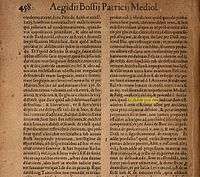In dubio pro reo

The principle of in dubio pro reo (Latin for "[when] in doubt, for the accused")[1] means that a defendant may not be convicted by the court when doubts about his or her guilt remain.
It is often used specifically to refer to the principle of presumption of innocence that dictates that when a criminal statute allows more than one interpretation, the one that favours the defendant should be chosen.[2]
Origin
The main principle in the sentence was part of Aristotle's interpretation of the law and shaped the Roman law: Favorabiliores rei potius quam actores habentur (Digest of Justinian I, D.50.17.125);[3] in English: "The condition of the defendant is to be favored rather than that of the plaintiff."[4] However, it was not spelled out word for word until the Milanese jurist Egidio Bossi (1487–1546) related it in his treatises.
National peculiarities
In German law, the principle is not normalized, but is derived from Article 103(2) GG, Article 6 ECHR, as well as § 261 Code of Criminal Procedure. The principle has constitutional status. The common use of the phrase in the German legal tradition was documented in 1631 by Friedrich Spee von Langenfeld.
In Canadian law, the leading case establishing how to decide criminal cases where the guilt of the accused depends on contradictory witness accounts is R. v. W.(D.).
See also
- List of Latin phrases
- Precautionary principle
- Presumption of innocence
- In dubio mitius
- In dubio pro duriore
References
- ↑ See "Famous Latin Proverbs and Sayings", Scribd.com, 2012, SD19.
- ↑ Cf. Supreme Court of the Philippines, People v. Temporada (2008), separate opinion by Corona, J.
- ↑ See http://www.thelatinlibrary.com/justinian/digest50.shtml.
- ↑ See http://law.academic.ru/985/defendant.
External links
- Larouer, Christophe J. (April 2009). "In the Name of Sovereignty? The Battle over In Dubio Mitius Inside and Outside the Courts". Cornell Law School Inter-University Graduate Student Conference Papers. Retrieved 26 August 2012.